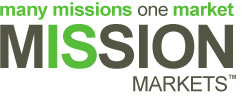Mission Markets Musings: David Meyers, PhD
The world needs some changes. Quite a few actually. As I go through my day, I often think about the food that I eat, the vehicles that get me where I need to go, the buildings I work and live in, and the wide variety of products I use. I ask myself, “How much of this is truly sustainable?” The answer is frighteningly few. When you consider that even “organic” fruits and vegetables come from miles (or countries) away, even the best products and services seem to be part of the problem and too few are part of the solution. Although this point of view may seem somewhat depressing, I am a strong optimist and believe that we humans can respond to the challenges ahead through our ingenuity, compassion, entrepreneurship, and greed. Yes, greed too. Perhaps my background will help explain my attitude.
I began my career as a scientist studying primate ecology and evolution and aiming to help conserve the earth’s threatened biodiversity. I first went to Madagascar for research back in 1985 and have spent nearly half my adult life in that amazing yet troubled country. My PhD (1993) research was on the effects of resource seasonality on the ecology and social behavior of an endangered Malagasy lemur – the Golden Crowned Sifaka. As a field ecologist, I learned of the many cyclical feedback loops in the tropical forests where nothing is wasted. One species’ waste is another’s food. Because the heavy tropical rains have, over time, depleted most of the nutrients under the forest’s peat layer, the forests are a closed sustainable system where the energy of the sun provides the systems’ energy and all nutrients are hotly competed for by the myriad species of trees, primates, birds, insects, fungi, and other life. Somehow we need to change our current economic system so it looks a lot more like a tropical forest than a smokestack.
After working in nature conservation for many years, I completed an MBA at Yale’s School of Management (1999). My goal was to use the power of business to make environmental conservation more effective. I used my new knowledge for a few years in various entrepreneurial endeavors in New Haven, CT during the technology boom, but jumped at the opportunity to return to Madagascar with my family in 2002. I helped establish a 400,000 hectare protected area, created carbon offset projects, conducted environmental impact studies, and founded and ran a triple bottom line sustainable bamboo flooring company – Madagascar Bamboo. After returning to the US in 2008, I fortunately connected up with Mike Van Patten and Steve Rocco. At Mission Markets, I merge my experience and passion about the environment and social wellbeing with my business experience – it’s a perfect fit. So back to greed…
To solve the enormous challenges we face as we make the transition from what Gus Speth calls the “Bubble” (when you jump off a cliff, most of the way down feels like flying) to a truly sustainable and happy society, we should not ignore our evolutionary past. This past has given us incredible intelligence, an astounding ability to work in groups, and also an impressive drive to get the most for ourselves, our families, and our social groups - greed.
How can we use our nature to help the planet rather than hurt it? In my opinion, the first step is to accept who we are. Humans seem especially well built for short to medium term thinking and we are constantly looking out for our own best interests. Business systems have been able to harness this greed and produced some of the most impressive technological and financial feats imaginable. Sustainable business and impact investing can harness this same power of greed to make the world a better place. If business profitability and planetary sustainability can be combined so that the business makes money and helps the world become a better place at the same time – then the more successful these businesses are , the better the world becomes. It may not be the only solution but the ground is coming up fast and everything you do matters. Where you put your money matters.
- David Meyers, PhD, Mission Markets CFO/COO
Mission Markets operates a private investment exchange facilitating transactions within the social and environmental capital markets. The Mission Markets platform provides companies and organizations with access to funding and impact investors an efficient way to evaluate, invest in and monitor sustainable investment opportunities.
MM10746

